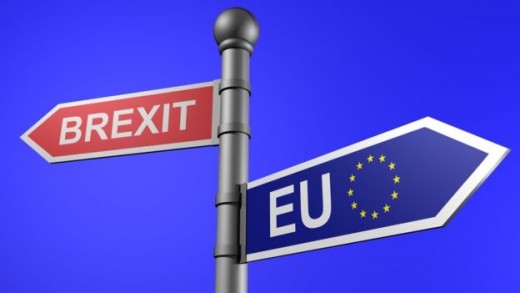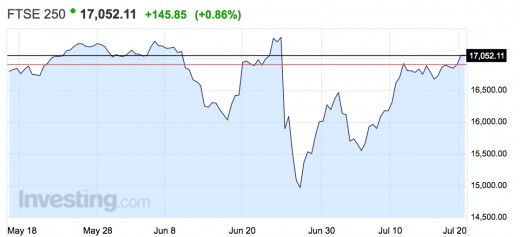Brexit And Its Impact on the World Economy

What is Brexit?
Brexit, which is a portmanteau of British Exit, refers to the United Kingdom’s decision to leave the European Union. The European Union is an economic partnership between 28 countries that formed after World War II to help cultivate economic prosperity and cooperation. Following an advisory referendum held in June 2016, U.K. citizens voted 52% to 48% in favor of splitting from the European Union. This result, a surprise to pundits, has had a substantial impact on the economy of the United Kingdom, created unease in global markets, and increased volatility in the United States economy.
The Effects of Brexit on the United Kingdom
Brexit has caused a sense of uncertainty about economic growth in the United Kingdom. The decision to leave the European Union has increased the tension between the United Kingdom and its international trading partners, and it could cause many multinational corporations to move operations to other countries. HSBC, a global bank with a major presence in London, says it may move 1,000 trading jobs to Paris due to the Leave Vote. This is because the U.K. will no longer be able to take advantage of “passporting”, an arrangement where a financial institution headquartered in the European Union can perform permitted activities in any other EU member state where it maintains a branch.

Another major effect that Brexit has had is the depreciation of the British Pound against other major currencies. The impact this has on the British market is a bit discrepant, more specifically the impact on businesses that operate inside the country. Major British exporters will benefit from the declining pound because their domestic costs will decrease while their exports will proportionately increase in value. At the same time, domestic producers that import component parts will experience an increase in costs and a significant decrease in profits. In addition to the significant drop of the Pound, the exchange rates between the pound and other major currencies have reached unprecedented levels of volatility, which could result in more selloffs in the medium to long term.

Brexit's Effect on Global Markets
Brexit can also have a major effect on the markets outside of the United Kingdom, especially ones that conduct business with countries that are members of the European Union. Since the United Kingdom comprises approximately one-sixth of the European Union’s economy, any stagnation of its economy could hinder economies of other countries. Britain is one of the largest economies in the world, importing billions of pounds worth of goods and services from other countries. If British consumers and businesses decrease their imports from abroad due to their declining purchasing power, they could stymie the economies of other countries. The Economist Group estimates that for every point decline in the U.K. economy’s growth, other European countries will experience one-half to one-third of a point declines, resulting in lower profits for European companies. European stock markets reacted to this news poorly with the FTSE 250 plunging nearly 14% in the days following Brexit. Similar declines were seen in Asian markets as the Nikkei 225 Index and Shanghai Composite Index lost 7.92% and 1.31% respectively. While the major markets have recouped their Brexit losses, uncertainty still remains as to the reaction these markets will have when the U.K. triggers Article 50 and officially exits the European Union.
Another effect that Brexit had was the increase in investment in what are referred to as “safe haven assets.” A few examples of these assets are the Japanese currency of yen, United States Treasury bonds, and gold. These assets all saw a substantial increase in value because many people removed capital they had invested in European markets and reinvested it into these different assets. In fact, demand was so high for U.S treasury bonds a few days after Brexit that an all-time record was set for the price of these bonds. U.S treasury bonds, along with Japanese yen and gold, are viewed as the only truly reliable investment option that large institutional investors will turn to in the event of an economic catastrophe, and Brexit’s volatility caused them to flee to these assets.

Brexit's Effects on the United States Economy
The effect on the United States market has been noticeable, but not as substantial as in other economies. After the vote, the index of all major U.S companies declined by about five points because many U.S investors sold equities from the stock market and reinvested them in safer treasuries. Shortly thereafter, the fall in equities completely reversed, and the S&P 500 Index reached an all-time high. Despite this increase in volatility, experts do not believe Brexit will have a major impact on the United States economy. According to a Wall Street Journal survey of leading economists, there seems to be no major changes in projected economic growth in this year or the next, and it does not seem that Brexit will have an effect on the U.S unemployment rate.
There are two major reasons that Brexit is not having a substantial effect on the United States market. The first is that the U.S economy is relatively isolated, as only fifteen percent of U.S gross domestic product comes from international trade. The second reason is that U.S investors were already anticipating an interest rate hike by the Federal Reserve, and they feared it could have a negative effect on the profits of U.S. based multinational companies. However, the Federal Reserve put that interest rate increase on hold due to the economic uncertainty following Brexit, and this left the U.S markets plenty of liquidity to go higher. In conclusion, Brexit will certainly have an impact on the economy of the United Kingdom and many others around the world, but it does not seem like an event that will cause a complete demise of any economy. A Trump presidency on the other hand? Well that's a topic for a different article.








